History
History is the study of the past. It encompasses all human activities and events that have occurred since the beginning of human civilization. By studying history, we can gain a deeper understanding of the people, societies, and cultures that have shaped the world we live in today.
Why Study History?
Studying history is important for several reasons:
- Understanding the present: By learning about the past, we can better understand the present and make informed decisions for the future.
- Learning from mistakes: History provides valuable lessons from past events, enabling us to avoid making the same mistakes in the future.
- Cultural awareness: History helps us appreciate and understand different cultures and traditions, fostering empathy and respect for diversity.
- Critical thinking: Analyzing historical events and sources encourages critical thinking and the ability to evaluate evidence.
Key Concepts in History
When studying history, it's important to be familiar with key concepts such as:
- Historical periods: Different time periods in history, such as ancient, medieval, modern, and contemporary history.
- Historical events: Significant events that have shaped the course of history, such as wars, revolutions, and social movements.
- Historical figures: Influential individuals who have played pivotal roles in shaping the world, such as political leaders, scientists, and artists.
- Primary and secondary sources: Different types of historical evidence, including firsthand accounts, artifacts, and scholarly interpretations.
Study Guide for History
Here are some tips for studying history effectively:
- Organize your notes: Keep detailed notes on key historical events, figures, and concepts, and organize them in a way that makes it easy to review.
- Use timelines: Create timelines to visualize the sequence of events and how they relate to each other chronologically.
- Engage with primary sources: Read firsthand accounts, letters, and documents from the time period to gain a deeper understanding of historical events.
- Seek multiple perspectives: Explore different historical interpretations and viewpoints to develop a well-rounded understanding of the past.
- Practice critical thinking: Analyze historical sources critically, question assumptions, and consider the context in which events occurred.
- Make connections: Identify connections between historical events and their impact on the present, and consider how they relate to current issues.
By applying these study strategies, you can develop a solid understanding of history and its significance in shaping the world we live in today.
[History] Related Worksheets and Study Guides:
.◂Biology Worksheets and Study Guides High School. Microorganisms I
Worksheet/Answer key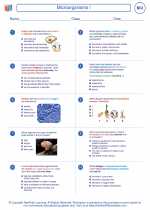 Microorganisms I
Microorganisms I  Worksheet/Answer key
Worksheet/Answer key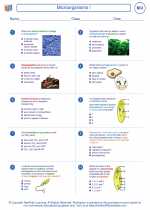 Microorganisms I
Microorganisms I  Worksheet/Answer key
Worksheet/Answer key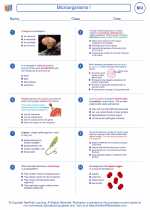 Microorganisms I
Microorganisms I  Worksheet/Answer key
Worksheet/Answer key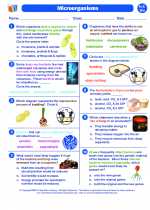 Microorganisms I
Microorganisms I  Vocabulary/Answer key
Vocabulary/Answer key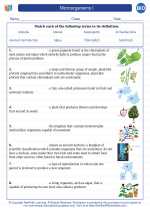 Microorganisms I
Microorganisms I  Vocabulary/Answer key
Vocabulary/Answer key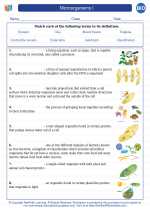 Microorganisms I
Microorganisms I  Vocabulary/Answer key
Vocabulary/Answer key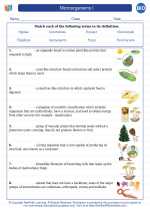 Microorganisms I
Microorganisms I  Vocabulary/Answer key
Vocabulary/Answer key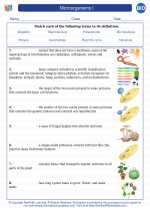 Microorganisms I
Microorganisms I  Vocabulary/Answer key
Vocabulary/Answer key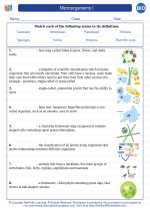 Microorganisms I
Microorganisms I 

 Worksheet/Answer key
Worksheet/Answer key
 Worksheet/Answer key
Worksheet/Answer key
 Worksheet/Answer key
Worksheet/Answer key
 Vocabulary/Answer key
Vocabulary/Answer key
 Vocabulary/Answer key
Vocabulary/Answer key
 Vocabulary/Answer key
Vocabulary/Answer key
 Vocabulary/Answer key
Vocabulary/Answer key
 Vocabulary/Answer key
Vocabulary/Answer key

The resources above cover the following skills:
BIOLOGY
Unity and Diversity
Obtain, evaluate, and communicate information to explain how organisms are classified by physical characteristics, organized into levels of taxonomy, and identified by binomial nomenclature (e.g., taxonomic classification, dichotomous keys).
Engage in argument to justify the grouping of viruses in a category separate from living things.